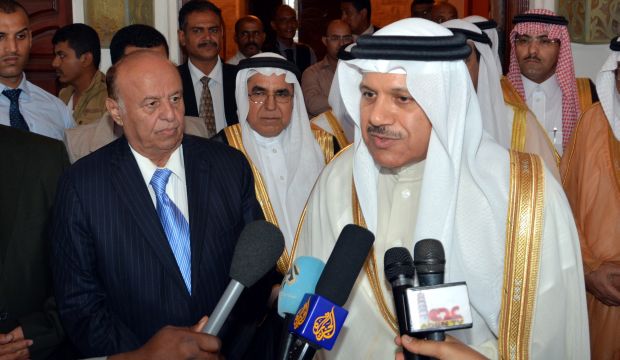Iran has knocked on Sana’a’s door, and Riyadh has answered.
The Houthi militia, also known as Ansar Allah, in January grabbed the reins of power in Yemen after placing President Abd Rabbuh Mansur Hadi, Prime Minister Khaled Bahah, and Minister of Defense Gen. Mahmoud Al-Subaihi under house arrest, a move that led to a dangerous political impasse in Yemen.
But President Hadi succeeded in escaping his prisoners and headed to Aden, a feat that was repeated by his defense minister, who was successfully able to dupe his Houthi captors during the initial period of his incarceration, making them believe he was on their side.
Legitimacy has now moved from Sana’a to Aden, where Hadi has resumed his presidential powers, directing a painful blow to the Houthis and Khomeini’s Iran in one fell swoop.
Now it is the Houthis, and their hidden backers, former president Ali Abdullah Saleh and his General People’s Congress (GPC) party, who are besieged, as the legitimacy is now once again firmly back in the hands of President Hadi, who also enjoys the backing of the international community. Last week President Hadi thanked the Custodian of the Two Holy Mosques Saudi King Salman Bin Abdulaziz for his support, and asked Gulf states to sponsor talks on the crisis in Yemen in the Saudi capital Riyadh. In what can only be described as a master stroke, Riyadh approved the call after consulting with the leaders of the Gulf Cooperation Council (GCC).
Iran is a master of the posturing and chest-puffing game. One such example of Tehran’s muscle-flexing routines are the recent remarks the Iranian news agency ISNA attributed to President Hassan Rouhani’s Special Adviser for Religious and Ethnic Minorities’ Affairs Ali Younesi, who said that “Iran today has become an empire as it was throughout history, and its capital now is Baghdad in Iraq.”
It seems Iran suffers from an almost incurable disease whose symptoms are animosity combined with a kind of ecstatic political and nationalist fervor.
In the 2009 book, The Devil We Know: Dealing with the New Iranian Superpower, author and former CIA operative Robert Baer writes that former president Akbar Hashemi Rafsanjani previously said in an interview that the mullahs in Tehran were fully aware of the massive duty they had to return the days of “Persian glory.”
Iran’s habit of reminiscing about its imperial past was at the crux of state propaganda under the Shah. It was understandable then, given the earthly nature of the rule of the Shah, but how does this pride, regarded in Islamist literature as redolent of the Jahiliya, or the “age of ignorance” that preceded Islam, sit with Tehran’s claims of its seeking the unity of all Muslims while at the same time appointing a Supreme Guide as the father figure of this new Islamic polity?
Is this fundamentalist chatter a mere cover for an ancient imperial dream?
This is not my own conclusion, but rather that of Iranians who themselves oppose the rule of mullahs. In his The Shia Revival: How Conflicts within Islam Will Shape the Future, Iranian–American academic Vali Nasr encourages the US to bet on Shi’ites against Sunnis. The book received numerous plaudits from US elites, and although he refers to himself as a liberal, Nasr argues that the Islamic Revolution and its associated concept of the velayat-e faqih (rule by a supreme Islamic jurist) forms both the galvanizing force and the bedrock of this revival.
Meanwhile, the Obama administration is currently in a coma and seems to be completely out of touch with the highly polarized sensitivities in the region—either out of ignorance or neglect. It is determined that openness to Khomeinist Iran is the only solution despite resistance from the Republicans. Recently, US Republican Senator and Majority Leader Mitch McConnell described Iran as a troublemaker in the Middle East, giving special mention to its role in the Syrian conflict.
So, has the Persian miniature in Sana’a come to an end before it has even been completed?
The talks in Riyadh will tell.
